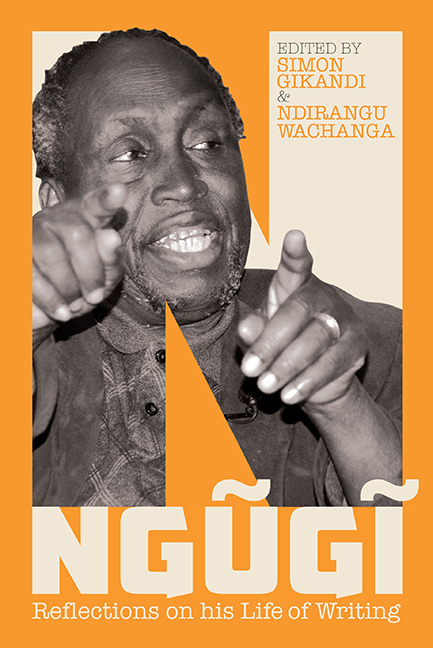Book contents
- Frontmatter
- Contents
- Preface
- Acknowledgements
- Chronology
- Photographic Section
- Introduction: Ngũgĩ wa Thiong'o: Reflections on His Life of Writing
- Ngũgĩ at Work
- Part I Serenades & Beginnings
- Part II Memories, Recollections & Tributes
- Part III Working with Ngũgĩ
- Part IV The Writer, the Critic & the World
- 23 Bricklayer & Architect of a World to Come
- 24 Revisioning Goethe's Idea of ‘World Literature’ [Commendation Address On the Awarding of the Dr. Phil. h.c. (Honorary Doctor of Letters) to Ngũgĩ wa Thiong'o, University of Bayreuth, Germany, April 2014]
- 25 Globalectics: Beyond Postcoloniality, & Engaging the Caribbean
- 26 Ngũgĩ & the Quest for a Linguistic Paradigm Shift: Some Reflections
- 27 Autobiographical Prototypes in Ngũgĩ wa Thiong'o's Early Fiction & Drama
- 28 Homecoming: The Idea of Return in the Works of Ngũgĩ wa Thiong'o
- 29 Gũcookia Rũĩ Mũkaro
- 30 Muthoni's Afterlives
- Part V The Other Ngũgĩ
- Appendixes
- References
- Bibliography of Ngũgĩ's Primary Works
- Works Cited
- Notes on Contributors
- Index
26 - Ngũgĩ & the Quest for a Linguistic Paradigm Shift: Some Reflections
from Part IV - The Writer, the Critic & the World
Published online by Cambridge University Press: 27 July 2019
- Frontmatter
- Contents
- Preface
- Acknowledgements
- Chronology
- Photographic Section
- Introduction: Ngũgĩ wa Thiong'o: Reflections on His Life of Writing
- Ngũgĩ at Work
- Part I Serenades & Beginnings
- Part II Memories, Recollections & Tributes
- Part III Working with Ngũgĩ
- Part IV The Writer, the Critic & the World
- 23 Bricklayer & Architect of a World to Come
- 24 Revisioning Goethe's Idea of ‘World Literature’ [Commendation Address On the Awarding of the Dr. Phil. h.c. (Honorary Doctor of Letters) to Ngũgĩ wa Thiong'o, University of Bayreuth, Germany, April 2014]
- 25 Globalectics: Beyond Postcoloniality, & Engaging the Caribbean
- 26 Ngũgĩ & the Quest for a Linguistic Paradigm Shift: Some Reflections
- 27 Autobiographical Prototypes in Ngũgĩ wa Thiong'o's Early Fiction & Drama
- 28 Homecoming: The Idea of Return in the Works of Ngũgĩ wa Thiong'o
- 29 Gũcookia Rũĩ Mũkaro
- 30 Muthoni's Afterlives
- Part V The Other Ngũgĩ
- Appendixes
- References
- Bibliography of Ngũgĩ's Primary Works
- Works Cited
- Notes on Contributors
- Index
Summary
If there is one issue in African literary studies that is most closely associated with Ngũgĩ wa Thiong'o it is likely to be the question of the language of African literature. Ngũgĩ has been the main and most persistent advocate for the ‘recentering’ of African languages in African creativity and in African societies more generally. One of the reasons for Ngũgĩ's seeming obsession with the language issue is the possibility that for long it has been an integral part of his journey as a writer to understand himself better, leading him back to Jean- Paul Sartre's fundamental question: ‘For whom does one write?’ For Ngũgĩ the answer came to be defined by his privileging of workers and peasants, and that answer ultimately influenced his decision to begin writing in Gĩkũyũ. Thus, the ‘question of audience settled the problem of language choice; and the language choice settled the question of audience’ (Decolonising the Mind 44).
I was among the critics of Ngũgĩ's position on the language in African writing, especially his specific argument that language somehow determines one's worldview in culturally specific ways. Over the years, I could not avoid seeing a line of relativist reasoning in Ngũgĩ most closely akin to the ideas of thinkers like Wilhelm von Humboldt, Edward Sapir, and Benjamin Lee Whorf. Like Ngũgĩ, Whorf had argued, for example, that languages influence, even determine, human perceptions of their world in a culturally circumscribed manner. I knew from my linguistic training that by the mid-1960s Whorf 's claims had fallen into disrepute, having been discredited on empirical grounds. My own theoretical orientation, then, was to extend this ‘discreditation’ of Whorf to Ngũgĩ in the crucible of African linguistics.
However, more recent developments in linguistics demonstrate that the ideas of Whorf are being rehabilitated somewhat by a relatively new school of thought of Cognitive Linguistics (CL). This differs from most other branches of linguistics in the belief that the knowledge of language that speakers have also involves knowledge of their experiences of the world as mediated though language. In time, CL studies began to reveal in rather systematic ways that how we organize, categorize and classify experience in our real world is not only manifest in language but can also be influenced by language.
- Type
- Chapter
- Information
- NgugiReflections on his Life of Writing, pp. 150 - 155Publisher: Boydell & BrewerPrint publication year: 2018



